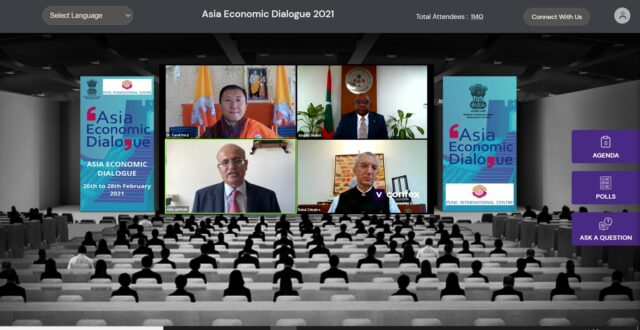NEW DELHI: India is willing to “shoulder greater responsibility” in the neighbourhood, Vijay Gokhale, former foreign secretary, underscored at a recent webinar in Pune, but in the light of China’s sustained inroads into the region, he acknowledged there were “other options”.
“We have begun to accept that as a large economy we need to shoulder greater responsibility. This begins not just with our immediate neighbours on land but in the vast Indo-Pacific region which is also our extended neighbourhood. We realise that many countries around the world, including our neighbours, have other options in a globalised world. They can pursue an open-door policy and a number of countries can come to their assistance. India has to adapt to this situation and build ties with the rest of the world by working harder,” he said.
The China factor was referred to indirectly by Maldives Foreign Minister Abdulla Shahid when he said “Any change in the Indian Ocean whether geological, geopolitical or geoeconomical can and will affect the Maldives.” A little over two years ago, Maldives was seen as firmly in the China camp until elections resulted in the defeat of president Abdullah Yameen.
India’s outreach to Africa may also be partly driven by China’s gargantuan $200 billion trade with that continent (against India’s $60 billion) and grand infrastructure projects. But as Rahul Chhabra, the senior diplomat in the Ministry of External Affairs handling Africa pointed out, India did not see the relationship in “donor-recipient” terms but as one of “equal partners”. He quoted from Prime Minister Narendra Modi’s address to the Ugandan parliament in 2018 that “our development partnerships are guided by your priorities”.
Among the high-profile projects India is building in Africa is the parliament in Gambia, the presidential place in Ghana, a clutch of power projects in Sudan and Rwanda among others. Africa has remained crucial for New Delhi for a number of reasons: It is an attractive market given that 54 nations are now grouped into the African Continental Free Trade Area. India recently signed a limited FTA with Mauritius off Africa’s east coast, so its goods can enter Africa duty free. Add to that the estimated 15 million strong Indian diasapora.
India is probably modelling its Africa outreach on the current Asia outreach where some of its neighbours expressed their appreciation for the “positive” and “proactive” manner in which New Delhi has responded to their concerns.
Traveller, bibliophile and wordsmith with a yen for international relations. A journalist and budding author of short fiction, life is a daily struggle to uncover the latest breaking story while attempting to be Hemingway in the self-same time. Focussed especially on Europe and West Asia, discussing Brexit, the Iran crisis and all matters related is a passion that endures to this day. Believes firmly that life without the written word is a life best not lived. That’s me, Ashwin Ahmad.





